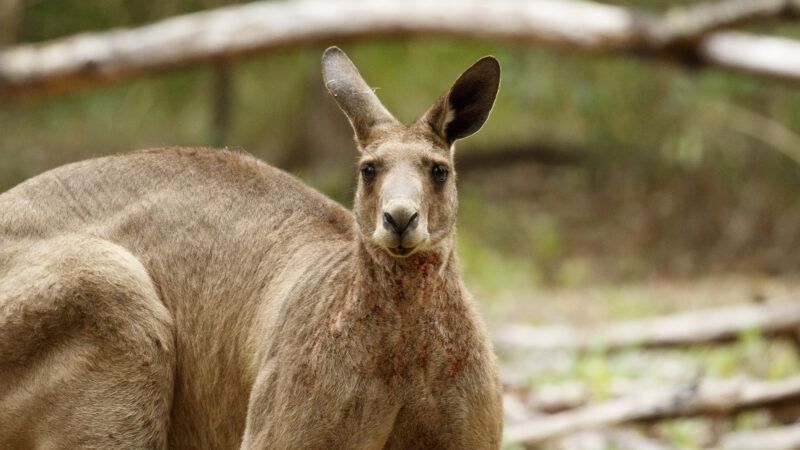Why Are Members of Congress Trying To Ban the Importation of Kangaroo Meat?
Congress should rue the day it hopped on the kangaroo-meat ban.

Rep. Matt Gaetz (R-Fla.) and Rep. Jamin Raskin (D-Md.) don't see eye to eye on much. Gaetz lied about the Capitol riot. Raskin led the impeachment of the man who incited it. On perhaps just one issue, though, they speak with one voice. What issue is so vital that it has united such seeming polar opposites? The apparent need to ban the sale of kangaroo meat in the United States.
Indeed, Gaetz and Raskin have joined with a handful of other bipartisan sponsors to promote the Kangaroo Protection Act, which would "prohibit the sale of kangaroo products" in this country, including meat and leather, and the importation of the same.
Under the terms of the bill, which is at once a joke and deadly serious, violators could face prison time and steep fines for each violation.
While reporting that Australia opposes the ban strenuously—the country exports around $80 million of kangaroo products to the U.S. every year—the Sydney Morning Herald also notes that a "coalition of animal rights groups [is] behind the bill."
By sheer coincidence, the Kangaroo Protection Act also contains language that would establish a private right of action, meaning people—in this case, likely animal-rights supporters and groups—could file suit against alleged violators to uphold the law.
As the Herald also reports, one of the groups leading the charge to ban kangaroo meat in the U.S. is Animal Wellness Action, headed by Wayne Pacelle, the former head of the Humane Society of the United States (HSUS), who resigned from that group in 2018 in the face of allegations of sexual harassment made by several female HSUS subordinates.
Pacelle says he thinks the bill to ban kangaroo meat has legs. "It's an easy vote for Democrats certainly, and also for Republicans to show they are animal-welfare friendly," he told the Herald.
It may appear an easy vote if one were to consider the opinions only of animal-rights supporters. In an interview shared by Viva!, a UK-based animal-rights group that opposes selling or eating kangaroo meat, David Nicholls, a former kangaroo hunter, describes why he gave up the hunt.
"I began to realize the place of humans on the planet did not come with special and intrinsic rights to do at whim with it and the creatures on it," Nicholls says. "I slowly turned vegetarian and am now a fully-fledged vegan."
Nicholls's transformation from hunter to vegan is all well and good, but it's also about as relevant to whether or not kangaroo meat should be legal as is any other person's dietary preferences—mine and yours included. About as relevant, in fact, as the Australian movement known as "kangatarianism," which is like pescatarianism but with kangaroo meat subbing for seafood as the eater's sole animal protein of choice. All of which is to say that no one person's or group's dietary preferences should have a bearing whatsoever on the legality of any food.
While I don't usually reference Wikipedia, its entry for kangaroo meat does an exemplary job describing the many ways that eating kangaroo is common, humane, sustainable, and a key part of the diets of Aboriginal and non-Aboriginal people who live on the continent.
"The commercial kangaroo industry offers a path for self-determination for Aboriginal people," Clayton Donovan, a leading indigenous Australian chef, told The Guardian this month. "And now another group of non-Indigenous are talking about taking it away entirely."
The proposed kangaroo ban comes as kangaroo meat is gaining in popularity in Australia, where it's valued as an "environmentally friendly alternative to beef and pork."
I've never had the good fortune to eat kangaroo. But Reason editor-in-chief Katherine Mangu-Ward, who has supped on roo, describes it as "outstanding… tender, extremely flavorful, appealingly rosy meat."
Sounds lovely to me.
"If you want to buy a Happy Meal with a horsemeat burger, a can of Four Loko, trans fat fried foie gras, and a side of shark fin soup, I applaud your right to make those choices," I once told the Washington City Paper. The rights of carnivores, omnivores, vegans, and kangatarians alike deserve the same applause—and protection.


Show Comments (130)